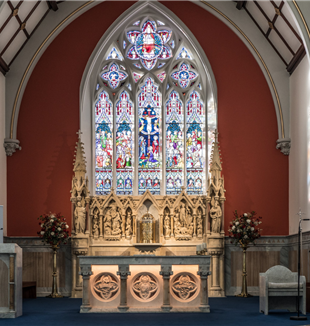
Farrell: "Courage is the mark of faith"
The homily of Archbishop Dermot Farrell during mass for the anniversary of Giussani's death. (Dundrum, Ireland, March 2)In the Gospel Jesus confronts the Pharisees who made a great fuss about being “religious” and observing the Jewish Law, while ignoring the values of justice and mercy it is designed to promote. Justice and holiness are first cousins.
Organized religion exists to offer God adoration and service. In fact, the purpose of the church, the sacraments has the one purpose of putting us in contact with God through Jesus Christ. Its purpose is to be a conduit of divine life to the world. “You must call no one on earth your father, since you have only one Father, and he is in heaven. Nor must you allow yourselves to be called teachers, for you have only one Teacher, the Christ” (Matt 23:9-10).
Religious leaders, both official and unofficial, should be the foremost examples who point to God as Father, and Christ as their Teacher. But God is difficult to perceive, and people can get confused and instead start worshiping the religion rather than the One it serves. Likewise, leaders can use the structures of a religion to serve themselves, twisting the teachings of the faith to attain wealth, power human favour and recognition while over-burdening the weak and poor.
Jesus warns against this twofold temptation. He rebukes leaders who draw attention away from God. In His own day, the scribes and Pharisees did so with ostentatious religious garb and tokens of social status. Likewise, He warns his own disciples against playing along.
The charisms of Fr. Giussani promoted during his lifetime were to draw people closer to God. Our life must be centred in Christ and in the Gospel. Courage is the mark of faith. In the end, the person of dynamic faith is not a credulous person, but a person of courage. Today we need God-given courage to communicate Fr. Giussani's vision of faith to a culture where there is neither harmonious uniformity nor an outright rejection of religion and faith, but, rather, seek a realignment of its place as a public reality. To become and be a person of faith, “is about an encounter, an encounter with Jesus Christ.” We are Christians because we have been loved and encountered, and not because somebody 'made us Christian.' Being Christian is about knowing that we have been forgiven and knowing that we are asked to treat others in the same way that God treated us” (Pope Francis, Rabat, March 31, 2019; see also Cardinal Ratzinger’s homily at Fr. Giussani’s funeral Mass).
Faith is not just words. It must touch the heart. It must speak to the deep longings of the heart. Heart of faith is not in the words in which it is formulated, but the God who speaks. First assent to God and entrust ourselves to God.
As Fr. Giussani so clearly articulated throughout his life, faith cannot be reduced to doctrines and moral laws, but is a relationship with Christ as He becomes visible within reality; Christ is the centre of everything. We come to know Christ in the community of the Church. The purpose of the Church is to be a conduit of divine life to the world. It is the bearer of holiness in its authentic traditions, in its Scriptures, in its sacraments, especially the Mass, in its Liturgy, in its doctrinal teaching and its saints. For Catholics Scripture and Tradition are in a dynamic relationship. Scripture and Tradition carry the deposit of faith. We need the Word which is carried by the living faith which is a community. Scripture and Tradition go hand in hand; not either/or but both/and. Christ called people to community. By its holiness the Church makes people holy.
Without a loving relationship with God, Christian life can become empty and an impossible ethic, a collection of rules and laws to obey for no good reason. God desires a true communion of life with us, a relationship based on dialogue, trust, mercy, compassion and forgiveness. The life of Fr. Giussani reminds us of this important lesson.
Read also - Tomasi: "Giussani's experience continues to bear fruit"
We ask the Lord to grant us the watchful and grateful awareness of the gift received in our encounter with Fr. Giussani’s charism, that we may continue to better serve the Church, recognizing that Christ dwells in every passing moment and, therefore, nothing is useless; everything is a sign of God’s promise to be always with the world and never abandon it.
Today’s Christian can never become complacent, all relationships need attention and nourishment. The encounter with Christ that Fr. Giussani advocated receives a wakeup call in this season of Lent, reminding us that conversion is not only a journey for Lent but for our whole lifetime. Lent—in its prayer and liturgy – brings us along the path of faith and repentance. Lent is not just the next forty days but it “a journey that involves our whole life, our entire being” (Pope Francis, Ash Wednesday 2021).